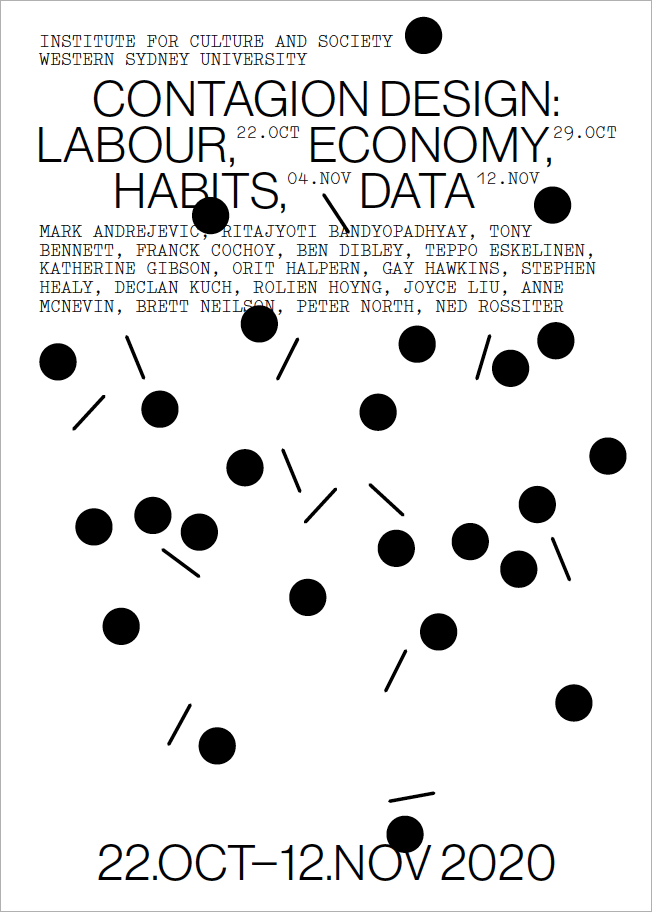Contagion Design: Labour, Economy, Habits, Data
International Symposium
Institute for Culture and Society, Western Sydney University 
Organizers: Gay Hawkins and Ned Rossiter
Click here to view full program with all session details.(opens in a new window)
Summary
How is contagion designed? How do labour, migration, habits and data configure contagion? Across a program of four weeks of discussion and debate, this event explored the current conjuncture through these vectors to address issues of rising unemployment, restricted movement, increasing governance of populations through data systems and the compulsory redesign of habits. Design logics underscore both biological contagion and political technologies. Contagion is redesigning how labour and migration are differentially governed, experienced and indeed produced. Habits generate modes of exposure and protection from contagion and become a resource for managing biological and social life. Data turns contagion into models that make a virus actionable and calculable. But can the logic of pre-emption and prediction ever accommodate and control the contingencies of a virus? The aim of this event was to explore these issues and their implications for cultural, social and political research. If contagion never abandons the scene of the present, if it persists as a constitutive force in the production of social life, how might we redesign the viral as the friend we love to hate?
This event organised by the Institute for Culture and Society at Western Sydney University included speakers from the ICS together with national and international colleagues and research institutes.
Recordings
Week 1: Migration and Labour
How does renationalisation in pandemic times partition labour and migration in ways that contest the national as a triumphant project resilient to a virus that demonstrates its power to destroy economy and life, work and society? Rather than affirming some mythic sense of the nation as a homogenized political space, renationalisation instead deepens already existing divisions and borders amplified by structural and technical logics of urban space and platform economies. How do the spatialities wrought by the current pandemic, coupled with the persistent continuum of global heating, transform patterns of migration, work and border politics? Further, can contagion be understood as a structuring force over and above attempts by government authorities to organize economy and society using policy instruments? This panel addresses these questions by exploring the connections between migration, labour, contagion and biopolitical techniques for designing worlds.
Chair: Brett Neilson
Week 2: Contagious Mutualities
The ‘Covid-pause’ has created a new context for calling business as usual into question. In this interregnum of an assumed world, contagious mutuality has gone viral – mutual aid practices large and small are being practiced and shared, the role of care-workers in holding everything together is brought to the fore and how to align thinking about post-covid economic recoveries with a longer term response to climate change has become a central question. This session explores what other economies might emerge if we let go of practices and institutions that inhibit ‘recovery’ for all, human and nonhuman. Scholars and activists investigating new models of production, new forms of mutuality, new roles for the public sector and new economic responses to the COVID/climate emergency discuss how to rethink and redesign vulnerable economies in ways that anticipate and align with climate readiness.
Chair: Katherine Gibson
Week 3: Habits of Contagion
French sociologist Gabriel Tarde was fascinated with the ‘suggestive realm’, with the power of contagion and imitation in shaping social life. For Tarde, being open to suggestion was not an indicator of animality or primitiveness, it was evidence of an almost pre-conscious or affective sense of being connected to others. This mode of connection is not based on emotional identification it is more like contagious communication, or a ‘group mind’. This panel explores how biological and social forms of contagion interact. How do suggestion and affective atmospheres shaped by fear of contact, crowds and contamination prompt new habits, and how is the governance of populations managed through the prohibition or reform of old habits? What role does suggestibility play in infrastructure redesign focused on the logistics of prevention and safety?
Chair: Tony Bennett
Week 4: Data Contagion
Computational systems generate data with a viral propensity. Multiplied across platforms, data mutates in recombinatory ways. The mixing of data unsettles order and systems of control. Digital networks provide tools able to measure the spread of contagion across economy, culture and society. But they are less able to register outside forces of politics and history that precondition the speed of distribution and scale of infection. This panel considers the propensity of data to build relations and produce worlds, amplified and accelerated within and across data regimes. What are the protocols of contagion specific to data? How do externalities shape the design of data relations? What is the relation between data and contingency? Can data be asymptomatic?
Chair: Ned Rossiter




